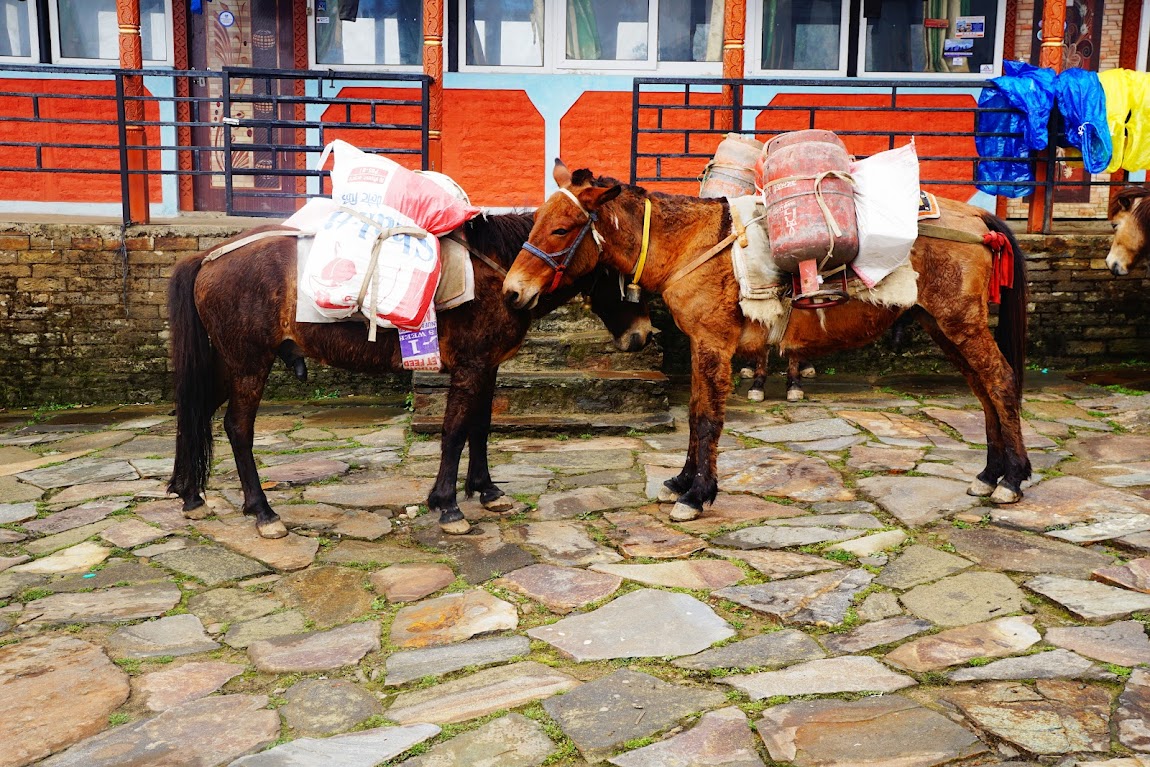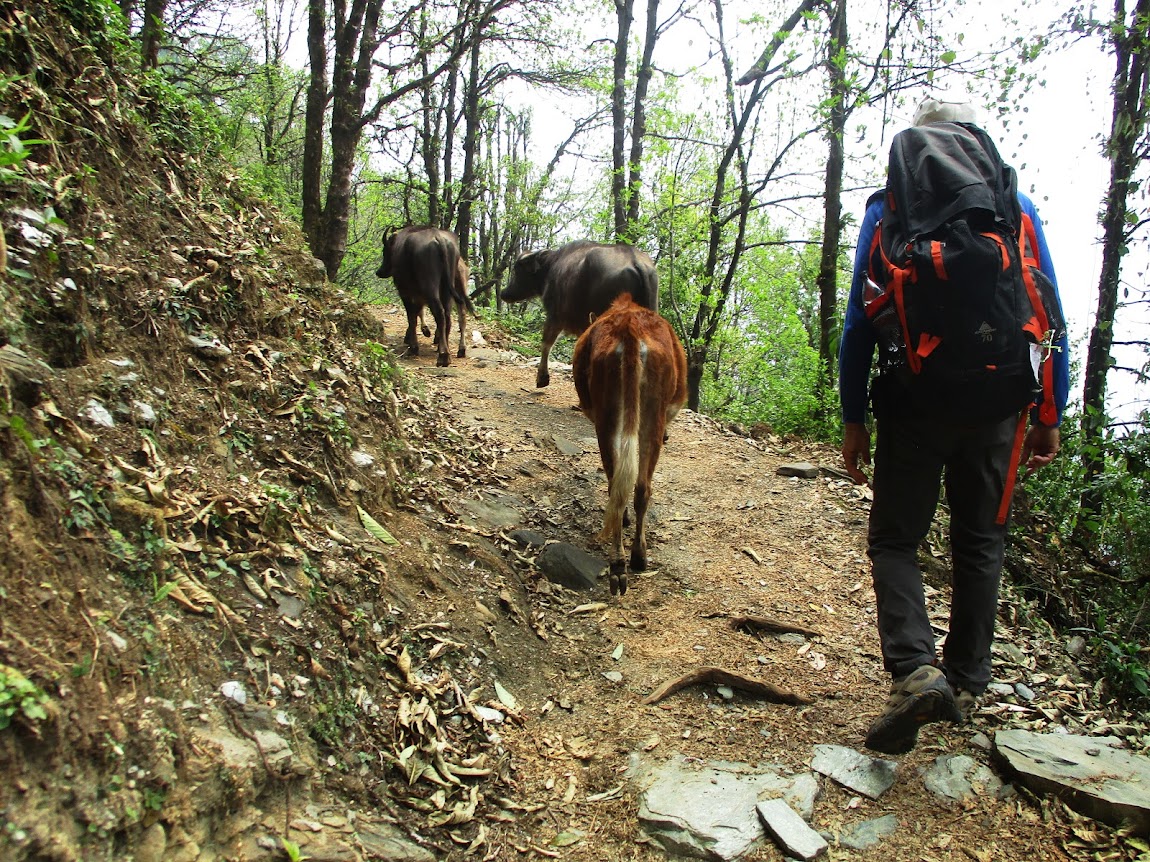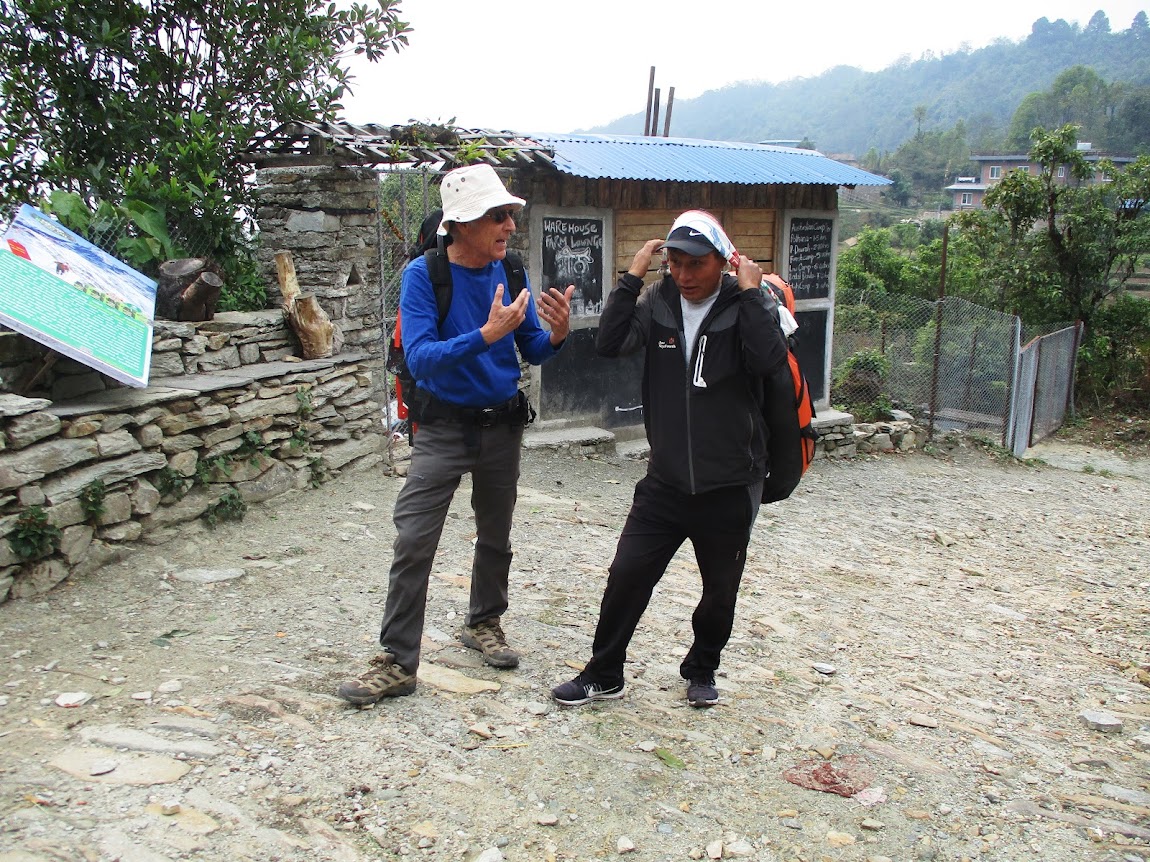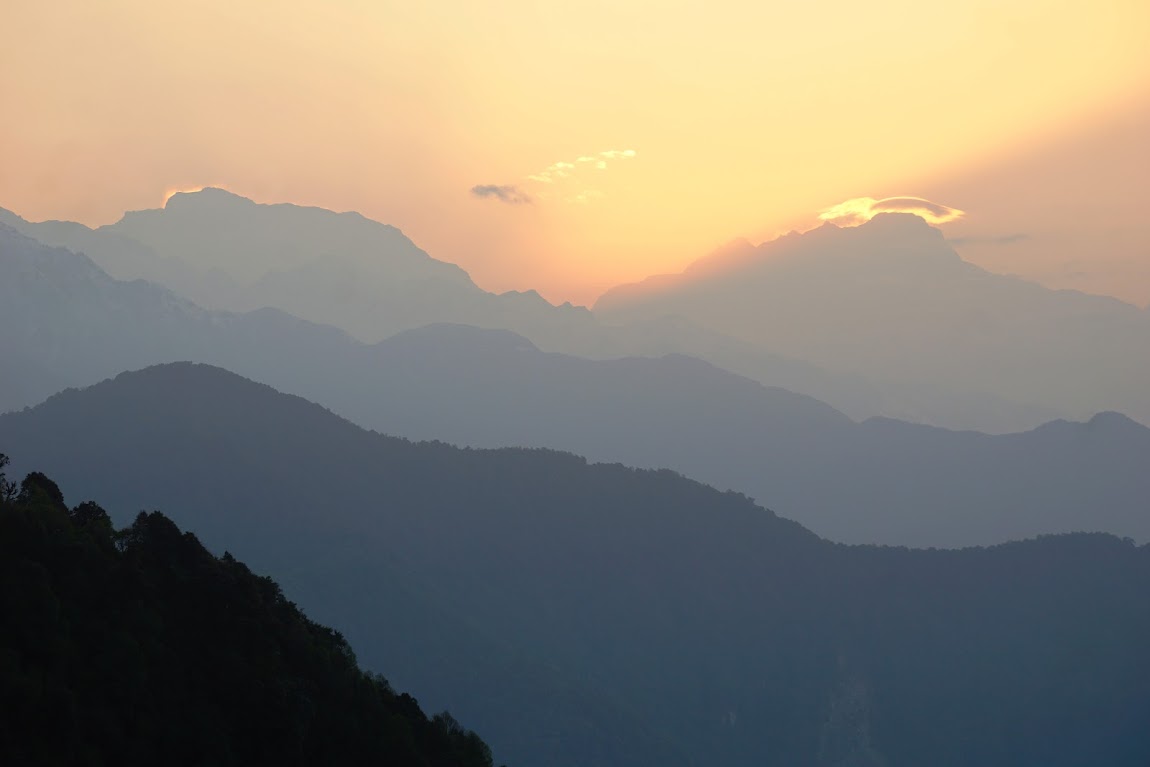second opportunity, we would like to have taken our children to Nepal for at least a couple of months while in their teens. I think for anyone, it’s an opportunity to learn about life and living and most of all, a means to appreciate the many material comforts we enjoy in the West, particularly for those born to parents of reasonable means, even less. Above all, I believe, not unlike a strict basic training undergone in a military boot camp, the winner will be recipients of such experience. I do believe it’s a life changing event for the good. I would add that the experience is not exclusive to Nepal but many other countries as well (more than many).
In the town of Cusco and among the villages of the Andes in Peru, similarities abound. Nepal, of all countries visited, is probably one that has made the most impression on us in a variety of aspects, hence, its selection. The Himalayas stand out above, both literally and figuratively, the other unbelievable mountain ranges of the world.
How can a person feel comfortable when struggling up a mountain, the air thinner than typical, and come across people carrying up to 100 pounds on their backs, a strap tied around their heads for support to aid in balancing of the burden, bent over, sweating, probably in pain and performing this task regularly for very little reward. I would suggest that should the observer not feel a sadness of the soul, a blow to humanity, the person might be lacking compassion and empathy with his neighbor. Understandably, it’s a job and it allows the person to survive financially. Who can question that? Yet, the mules, yaks and buffalo perform similar tasks and truth be told, it’s not easy to watch these animals carry their burdens either. Finally, one may argue that because we in the West are relatively ‘soft’, perhaps to the locals, such jobs including that of a porter, guide and Sherpa are not unreasonable means to an end.
On our previous visit to the country, we constantly were in awe of the natural attributes of the land. This time, there is no change, perhaps even more appreciative. On the other hand, we are less tolerant of the business dealings of the inhabitants. After approaching most purchases of goods and services needed with good intentions, we have had to change our mode of operation. The first price offered is a high starting point. In fact, everything is a negotiation which becomes tiresome after a while. This applies to a taxi fare, clothing, accommodation and most other items. While weighing items, watch out for the 'hands pushing on the scale'.
In the cities, especially Kathmandu, the peddlers can drive one nuts. How much jewelry, musical instruments, fruit, knick-knacks can one buy even when its shoved almost up one’s nose while avoiding being struck by a vehicle, scooter, motor bike, rickshaw or bicycle. At the same time, one has to watch for potholes, uneven surfaces, shop owners sweeping the sidewalk while we pass or narrow edges with the feather dusters creating even more dirt and dust than the body can handle. At all times, one has to anticipate the traffic which abides by no rules other than to use the horn as an all-encompassing tool of the road.
The equivalent of a San Diego carpool. We pass the kids as they warm up for school. Who benefits more? The riders or the walkers?
The children wear school uniforms which we like. The young, especially toddlers, are cute, smiley and warm the hearts. Unfortunately, some of the kids (not many) are used by their mothers to beg for money. They can become quite aggressive in their endeavors. When the kid appears to be making progress, the mother will surface, become demanding and aggressive. Handing out charity is wonderful and often it provides more benefit to the giver. Nevertheless, the daily grind of the procedure together with tumult, the noise, dust and road danger begin to wear one down.
But Nepal is more about the smaller towns, the mountains, trails and adventure. Like most places, the people living outside the large cities differ from their commercial brethren in such places. They are respectful, helpful and retain the core values that appear to us to be far more apparent in the rural areas. On our last trek, we met many youngsters ranging from 20 to 30 years of age. It was an opportunity to meet locals who were trekking which we missed previously but for a few. We noticed these young people were confident, competent and frankly, lacking the humility of their parents. One crowd of four, three young men, boys really, were accompanying a young German woman. It’s typical of the locals to inquire from where a person hales, ascertain background and then tell one about themselves and determine how much one is enjoying the country. Most speak English and this one youngster had me trying to help him develop an accent. No telling what can happen on a trail as one does meet fascinating people from all over the world, walks (hikes) of life and in unusual circumstances.
On a day, we met a Dutch family including a relation who was partly Indonesian. We were making our way down the mountain which of course incorporates many ups with the aim of consolidating the day into one descent of the previous two-days ascent, if that makes sense. We were able to speak Afrikaans, enough to communicate with them and of course, reverted to English soon. The Dutch and German nations speak wonderful English—it is enviable. On parting from the rest stop, we realized the discussion and exchange of ideas, observations and common history had, as we said, ‘made our day’.
Later, we spoke with a young French couple in the dining area of the teahouse (hotel) and a Peruvian couple, too. It never ceases to surprise us how wonderful these exchanges are. It gives us an opportunity to learn more about today’s youth, our contemporaries and younger, cultural issues and really, have a stimulating time. While we do notice that the youth are far less open and friendly on the trails themselves—years of training not to talk to strangers seems to have worked well—once in a more intimate environment, things usually change for the better. The Frenchman even spoke a few words of Afrikaans—he had lived in South Africa for a while.
One of our favorite mountain sights, Machapuchare, at 23,000 feet also known as Fish Tail. This is a holy site, thus nobody is allowed on the mountain.
From 4 years ago, a night view before last light, from a different position, some 2 miles closer.
Hygiene. Should a person worry about contracting germs, diseases, infections then perhaps, this is not the place to visit. Of course, we practise hygienic protocols seriously but this country will test a person. One of the limitations of humans is the need to eat regularly. On the contrary, I realize some people see eating as a good reason to live. I should get a rise out of some for that comment. In Kathmandu, we lived in an apartment which looked down upon a nightclub and restaurant. The façade of the establishment was one of the most modern we had seen. However, the dishwasher was outside in the back, that is, below us. The dishwasher involved a couple of guys filling a tub with water and dipping the cutlery and crockery in such tub. Jen noticed the dipping of a cabbage in said tub, too. A diner would walk in through the front, notice this attractive restaurant but have no idea what he’d be eating off and with and quality of preparation. I sometimes wonder how Covid survived in the country under these conditions.
We watched the making of Naan bread, all hands on deck, Greek food at a takeaway on another occasion where the person prepared the dish, picked his nose, took cash…you get the picture. Lesson learned: Close your eyes or return home. In the beginning we were horrified. The hungrier one becomes, the less horrified the feeling. Take-away curries from dives that most Westerners could not conceive of would make your taste buds tingle (could not think of anything comforting…) Don't imagine where those chef hands have been, how clean they must be if what’s on display can intimidate one. For a person who is sensitive or even reasonable about hygiene issues, eating out can be a nightmare. Some suggest not eating salads because of poor washing of the ingredients. Don't over think it. By the way, water has to be boiled or purchased in sealed bottles. On treks, we use purification tablets. Who said incredible adventures were easy to experience? Nevertheless, in our experiences as mentioned frequently, without struggle there are no meaningful accomplishments. We’d like to make an exception in the case of water and food.
We wonder whether the locals are in fact stronger than others because of having built up resistance to the germs. We know of people who travel with their own linen, don’t touch door handles for fear of contamination. Obviously, we question their approach but think a visit to Nepal would either cure or kill them. A main purpose of a visit is for trekking so it's easy to avoid the country should that not be of interest. Take your linen elsewhere would be our advice. Notwithstanding the comment, we reiterate just being intertwined in this culture and land is an experience not to be missed.
The United States, particularly the western states, is a land of incredibly beauty and opportunities for nature lovers and hikers. In order to provide some perspective, in the contiguous states, the highest mountains reach altitude in the mid-14,000 feet range. Besides Mount Everest, a number of ranges extend to over 28,000 feet. It’s overpowering. Who cannot stare at Everest in wonder. However, Fish Tail, Lotsi, Amadablam and others are really even more attractive, showing off shapes that arouse the artistic side of a person, for want of a better phrase.
Hmm! 28,000 feet, give or take.
As is the case in many third world countries, they like ‘paperwork’ and are officious. Permits, conservation levies and other fees are payable. Insurance policies are required on certain routes. It is now mandatory to take a guide with one on most treks. Governments love power and abuse of such powers is even tastier. Our requirements are not for a guide but rather, for a porter to lug the extra weight. Since Jenni has put on extra weight, the porter helps rather than her having to diet. (It is known that a lack of oxygen can cause confusion in a person, hence, I lose it from time-to-time.) Should you see some of the photographs of Jenni on the blog, she’ll often be shadowed, in this case, by Krishna Ghale.
By the way, he is a good man and guide. We met him 4 years ago and have maintained contact ever since. He provides a wonderful service, is knowledgeable, knows everyone on the route, the teahouses, sights and directions. Anyone wishing to visit the Himalayas, should think seriously about contacting him via email…krishna.ghale@gmail.com. He will ensure that you experience trails that suit your abilities while keeping you safe, informed and maybe even warm, too. We believe a visit to Nepal, preferably roughing it a bit, is a life enhancing, even a life changing event.
The surroundings are mostly breathtaking; at times, we're plain breathless. 
Since our previous visit, a number of teahouses have been built along the Mardi Himal trail. The concept is a good one although we did notice a surplus of available accommodation on the trek. The concept is simple and practical. However, for a person requiring luxury or comfort, or even the most basic facilities then perhaps it would be better try somewhere else—the Four Seasons Hotel Group is not in this league. Once again, we think the pictures provide an overall impression but do miss some of the nuances. Off the very busy trails and out of peak season, one can arrive, accompanied with backpack, perhaps a hiking pole, guide or porter, weighed down with lots of banknotes (US1=130Rp). In addition, I’m fortunate to be with Jenni. Unlike the American Express slogan, you should leave home without a credit card. Call ahead and book a room or just arrive. With the additional lodges (love that term), it seems there’s an establishment every forty-five minutes of walking along the trail. Depending upon where one is, one could also arrive in a village, some small, others big as towns.
As one rises in altitude, not only does the air pressure change but inflationary prices take hold and attitudes harden. In addition, services diminish. In Kathmandu, a bottle of soda runs at 80 cents whereas at Gorakshep, one camp before Everest Base Camp, the going price was US$6 on our last trip. It was difficult to pay that price but after watching the men, animals and even helicopters bring in supplies, I felt justified—some rationalization. I still believe I acted spoiled in making the purchase. Fortunately, Jenni compensated by skipping having a manicure at the said camp. Whatta gal! You may think I’m silly (realistic thought) but years ago, one woman asked Jenni where she has her hair done when we are on Hike-about in the wilderness. Who ever heard of a brush…comb anyone?
As one tires, the thought of reaching an hotel becomes a delightful dream. Rising up or dropping down in the forest keeps one secluded but suddenly, the blue, green or red roof shines through the trees like a beacon. Aha! We are close. Depending on the time, there may be a few people sitting around tables drinking hot beverages and snacking or if arriving prior to 2-3pm, it’s likely to appear deserted. Invariably, between camps (lodges/teahouses) one often finds ‘cafes’. The proprietor offers snacks, beverages and perhaps some useful incidentals. To date, we have not come across hair salons, massage parlors or drycleaners. On arrival, we check in, sometimes selecting a room when available. It does wonders for one’s self-esteem to select a room. ‘Hey, Jen, I got us a non-leaking bedroom with a view of the clothesline.’ The tariff is nominal provided the guests take at least two meals a day at the establishment, usually dinner and breakfast. Upon completing supper, one will be asked to place a breakfast order. I find we don’t seem to be too excited to order breakfast upon swallowing our last morsel of the main meal. We hope to survive the night following a successful digestion.
In each teahouse, the menus are standard providing a wide variety of foods. When we say standard, it’s an identical menu in each dining-room. Many things are uniform such as construction techniques, locks are identical, beds, blankets and the style of business, too. Once you learn the process of staying at one establishment, nothing changes other than the color of the walls and state of neglect. Thus far, the only item not available was the ‘Veggieburger’. However, there is a numerous assortment of soups available, mostly of various colors but all taste the same. We tried the Tibetan bread and were pleasantly surprised. We always order brown or wheat bread which appears available, but it arrives white. Shows one how strong the European influence really is in the country. A local favorite is of course the ‘Dull Butt’ (Dal Bhat) which I believe is spelled differently but pronounced as written (typed). I will admit that the type of female hikers covering the mountains has proved how interesting and attractive the dull butt can actually be when exercised and dressed with care.
The next target, a rest camp deep in the forest, high in the mountains.
On the Mardi Himal trail, there are many hotels/lodges/teahouses (same thing). In fact, the number of establishments for overnight stays are phenomenal. What’s equally interesting are the names of the places, mostly in English, often humorous and descriptive. I mean would you wish to stay in something with a dull name such as the ‘Hyatt’ when you may choose ‘Hotel Miracle’, ‘Best View’, ‘Hotel Awesome’ and numerous others and at prices of say $8 per night? For that amount of money, you get a bed with mattress, duvet or blanket, sometimes a light, a window and door, possibly a socket if lucky, and if you are most fortunate, occasionally electricity. In some places, a toilet might be available in the room but bring your own paper and flashlight. A wash basin is rare but a faucet (tap) might be provided within the bathroom which spouts water directly onto the floor. The trick is to position oneself between the spout and the floor while balancing a towel and dry clothes elsewhere. All bathrooms in our various apartments (in cities) provide a shower, toilet and basin. However, the whole of the bathroom doubles as the shower floor. It’s a lot of fun especially when wet as you can imagine how slippery it becomes. Nepal is an American plaintiff lawyer’s litigation dream.
Toilet anyone?
Toilets are a concept in themselves. Some may find that this aspect of the country makes a visit impossible. Unlike most western countries, although there are exceptions, there is at times, choice. One can use the local custom toilets or the western style, when available. The former is used in the squat style. Thus, before embarking on a trip to the country, it’s advisable to strengthen one’s knees and thighs. Quite frankly, the squat style of relief is anything but relief—in a way it promotes constipation for those with a negative attitude to this style of toilet. Fortunately, we have only had a few occasions where only the local facility was available. We have often maintained, probably to the ire of some, that a truly glorious way to appreciate the comforts of home is to visit third-world countries. While this might seem disparaging, it’s not. Meaningful lessons are learned as well incredible experiences are earned.
To be continued...
Making our way down, two lodges come into view. The possibility of a cuppa tea or for the daring, a Coke, loom. (Susy, we skipped the Coke.)
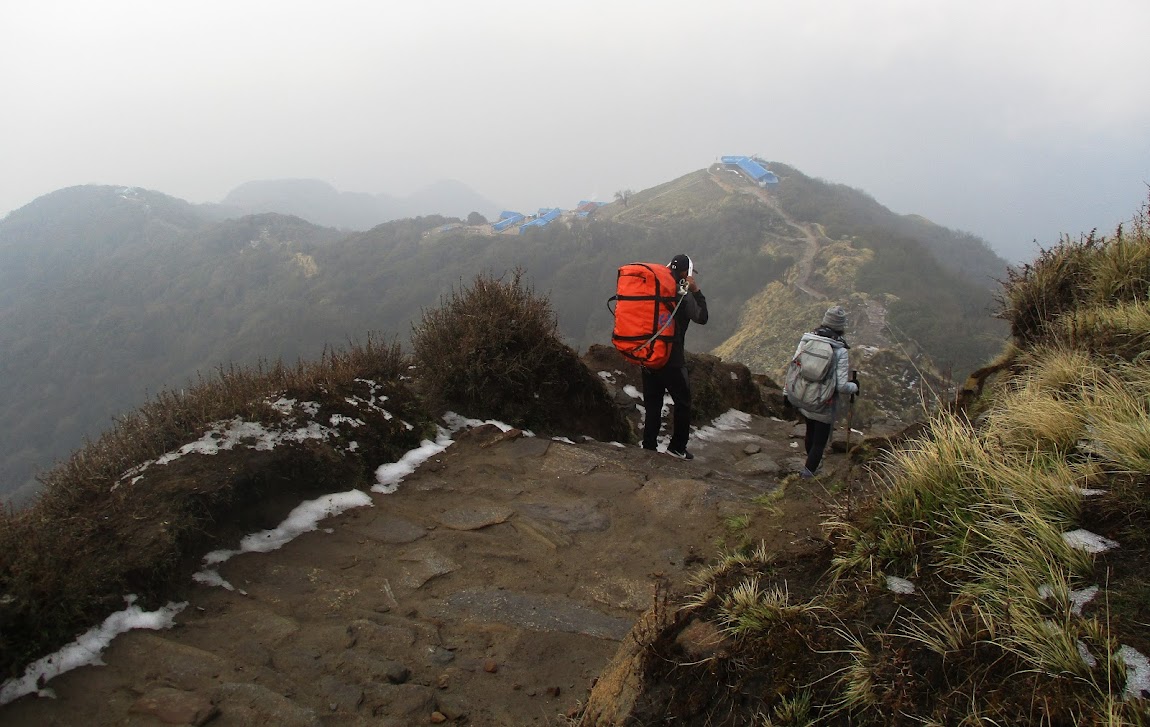
The early mornings are glorious.





